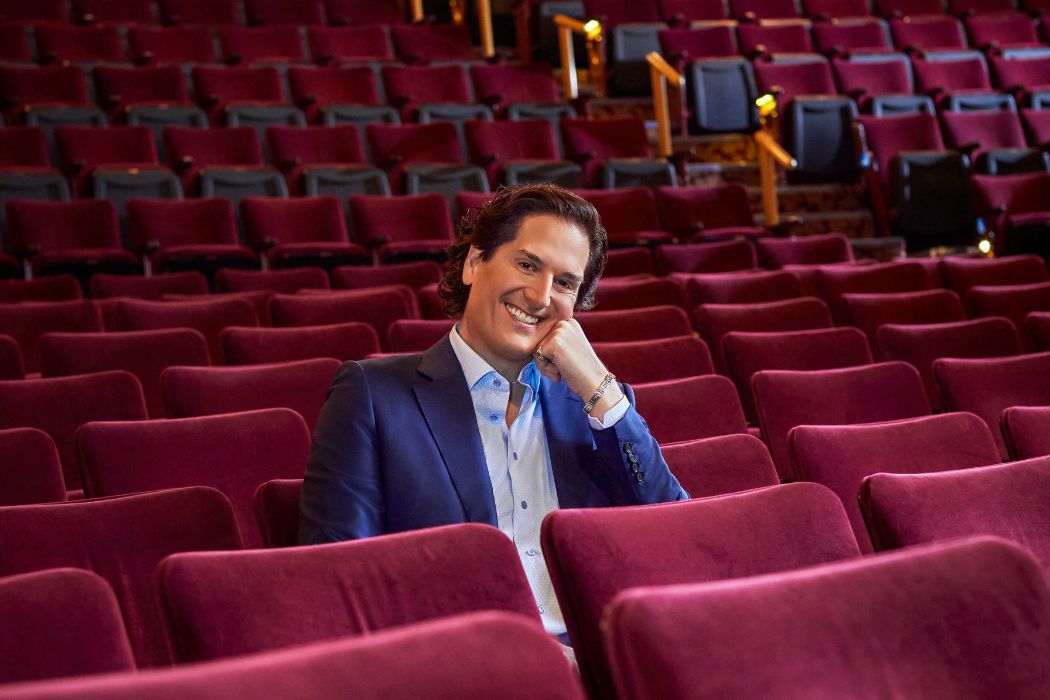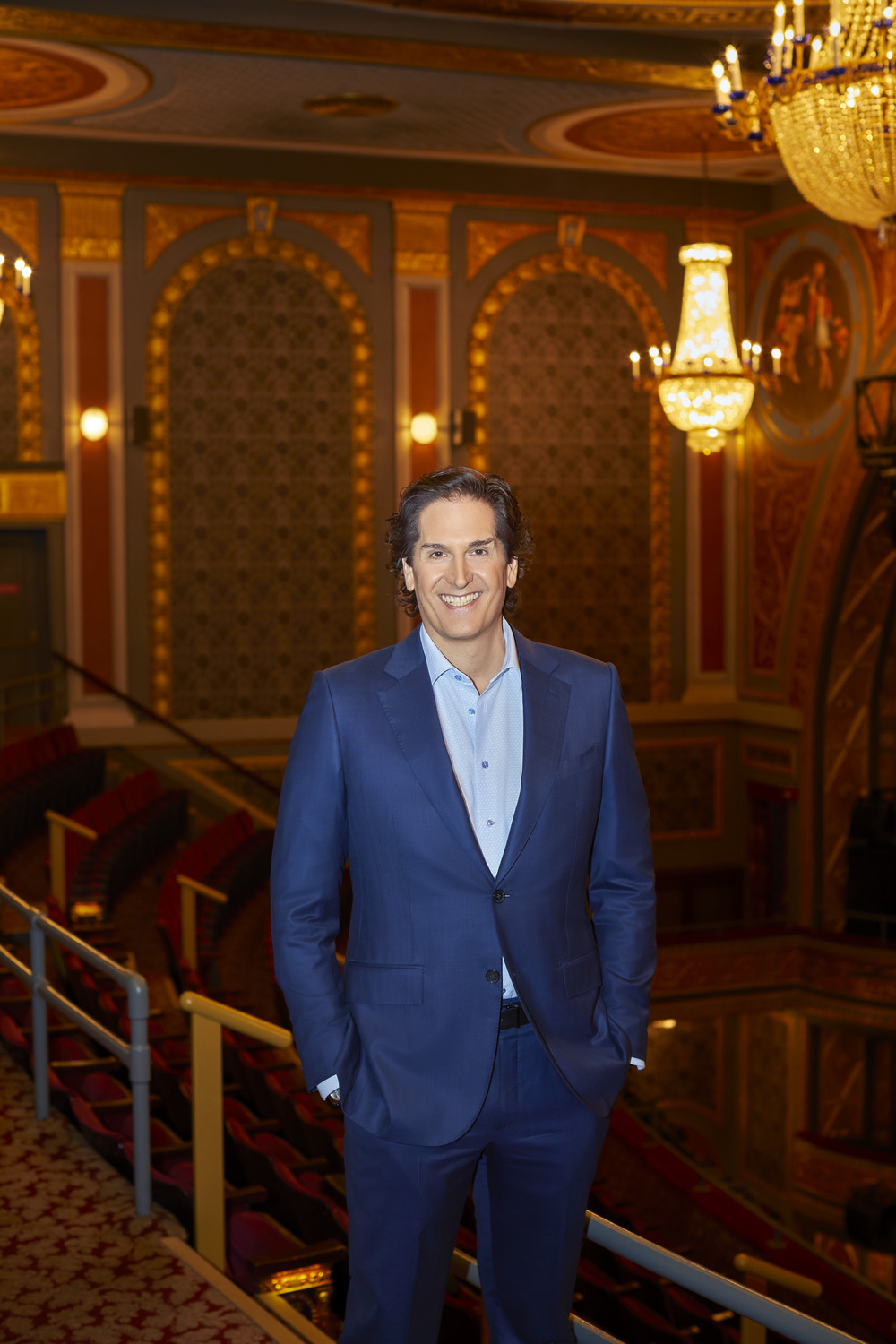Originally published in the inaugural edition of Carroll Capital, the print publication of the Carroll School of Management at Boston College. Read the full issue here.
“I ’m not hiring you. I just wanted to meet the person on the other side of this resume.” That’s what Nick Scandalios ’87 remembers being told when he stepped into the bustling Manhattan offices of the Nederlander Organization during summer 1987. It wasn’t exactly what he was hoping to hear.
On paper, Scandalios knew he was an unlikely candidate for a receptionist job with a company known for producing some of Broadway’s biggest shows—he had, after all, just graduated from the Carroll School summa cum laude with a finance degree. But as the person on the other side of the resume, Scandalios saw a prime opportunity in front of him. Here was his chance to learn the ins and outs of the theater industry hands-on—and he loved theater.
Thanks in no small part to his radiating enthusiasm, his pitch worked. The receptionist job was his as long as he made a small promise: He had to stay for at least six months. “They thought I was going to be bored out of my mind,” he says, laughing. But Scandalios kept looking ahead. He’s now been with the company for nearly 36 years, no longer a receptionist, but the executive vice president.

Nick Scandalios '87
Growing up in Port Washington on Long Island, Scandalios always enjoyed singing and performing, but he found his passion for theater the first time he heard the soundtrack to Evita. “I became obsessed,” he says. If he closes his eyes, he can instantly transport himself back to being a teen, swept up by the music.
At the same time, he says, “Being good at math in our house was a prerequisite to breathing.” His father was a computer programmer turned banker, and his mother was a high school math teacher—both the children of Greek immigrants and very practical. They struck a deal with their son. If he got a business degree first, they would then pay for any acting program he got accepted to. The compromise seemed fair enough to Scandalios, who was just beginning his college search.
Getting a peek at Gasson Hall down Linden Lane was enough to make him fall for Boston College. During his years in business school, he couldn’t quite shake his theater aspirations and got involved with the Boston College Theatre Department. He even starred as Tony in West Side Story his senior year. Summer breaks in Port Washington were spent balancing banking jobs with putting on shows with Harbor Theater Company, which he cofounded in 1984 as away to give young adults like himself acting opportunities.
But the looming deadline of graduation was catching up with him. He got into the Chase Bank training program—his father was a Chase executive, although Scandalios never worked under him—and his future seemed set. That is, until a Chase colleague of his father’s called him up one day and “proceeded to scream at me for what felt like an eternity, but was probably only about three minutes of expletives,” Scandalios says wryly.
The gist was this: He knew about the young man’s passion for theater and was adamant that people like him and Scandalios’s father shouldn’t work their whole lives just to see their children not follow their dreams. “He said to me, ‘You have to go try this. If you don’t do it now, you’re never going to do it,’” Scandalios continues. “I was at that age where there’s this push and pull of finding my own identity. If my father had said it to me, I would have never taken the advice.”
He did take the advice, leaving Boston College unemployed but with a stack of resumes he sent to every New York theater organization he could think of, ending up at the Nederlander Organization before the summer was out. The company is the owner and operator of more than 30 venues across the US and England, and a prolific producer on Broadway. It’s also a family business, a theatrical dynasty started in 1912 with the purchase of a 99-year lease on the Detroit Opera House by David T. Nederlander.
David’s son, James M. Nederlander, also went into show business, heading to New York City and purchasing the Palace Theatre in 1965. The organization is now one of the world’s largest privately held entertainment companies and owns the second most Broadway theaters. Their tenants include wildly popular productions like Hamilton and The Lion King. “It’s a small industry with an outsized impact,” Scandalios says. We’re sitting in the Nederlander boardroom, overlooking Times Square. Music and sirens punctuate the conversation and brightly colored LEDs reflect off the framed Tony Award nomination certificates that cover the walls.
“Gen X and the millennials are the core of the theater audience [now], so that’s where our storytelling needs to focus.”
When he started with the organization, Scandalios was told that Nederlander, called Jimmy Sr., likely wouldn’t remember his name for six months. But one day, Scandalios heard someone call out, “hey Nick!” Nederlander had remembered his name and it had only been two weeks. Within six months, he became Nederlander’s personal assistant, and Nederlander became his mentor and advocate. “He was an extraordinary genius,” Scandalios reminisces—over his shoulder hangs a commanding black-and-white portrait of Nederlander. “By the time I was 28 years old, I was almost in the position I’m in today because of the dynamic of working so closely with him.”
After Jimmy Sr.’s death in 2016 at the age of 94, the torch passed to his son James, often called Jimmy Jr. “I can be the same person for him that I was for his father. There is so much built-in trust,” Scandalios says. He acts as a chief operating officer, shifting between the different arms of the business. “It’s a real estate company, a theater production company, a theater touring company, and now a ticketing operation,” he says. “On any given day, I can exercise different muscles. Some tasks are more for my creative brain, some are more analytical, and some are pure financial brain.”
That ability to leapfrog between projects makes Scandalios stand out to anyone who catches wind of it. In 2017, the Boston College Theatre department named Scandalios the Father J. Donald Monan Professorial Chair in Theater Arts for the academic year. In a press release marking the occasion, Crystal Tiala, chair of the Boston College Arts Council and theater professor, called him “as generous and kind a person as he is a brilliant businessman.”
Scandalios is still a guest lecturer for the annual course Principles of Theatre Management and invites students to New York to get industry insights firsthand. “You can tell how much he loves giving back to these students,” Tiala says. “He just beams from ear to ear. He’s wonderfully approachable.” Scandalios likes to tell students that life is about “being in the right place, at the right time, with the right skills, making the right choices.” He stresses that there aren’t actually wrong choices per se, but we are all the sum of our choices.

Despite the balancing act of his daily schedule, Scandalios is extremely generous with what free time he has, volunteering with his church and nonprofits like Family Equality, which advocates for and protects the rights of LGBTQ+ parents and their children. It’s an immensely personal cause—he and his late husband Ric Swezey had their two children via surrogacy in 2007. Swezey passed away in a tragic accident when the couple’s twins were only nine. Accepting the Isabelle Stevenson Tony Award in 2018 for his humanitarian work, Scandalios said that it was the joy of holding the twins that moved him and Swezey to get involved with Family Equality.
“Every child deserves the right to grow up in a loving home,” he says. “The idea that [anyone] would want to deny people the ability to form families and raise children—take in foster children and adopt children—it’s unfathomable to me.” His children, now teens, have shown no interest in the industry that has profoundly shaped Scandalios’s life, but he doesn’t mind. “My parents let me follow my pathway. That’s what I want for my kids,” he says. “I’m going to spend zero time trying to convince them. It has to come from within or it doesn’t have longevity.”
A few blocks away sits the Nederlander-owned Palace Theatre, sheathed in protective scaffolding. It has played host to everyone from the Marx Brothers to Ethel Merman to Liza Minnelli in its century-plus of operation. With Times Square rents at a premium, the theater is being carefully raised 30 feet as part of a $2.5 billion redevelopment project. It’s a major engineering feat for a city landmark that was once a vaudeville house and then a movie theater. Now it is evolving once again. When complete, the building encasing the theater will include retail space, a hotel, and an outdoor stage, all to entice Broadway patrons to stay awhile.
After Covid-19 shut down Broadway for 18 months, the industry is still climbing back to its pre-pandemic output, Scandalios says. With the scores of retirees and remote workers that have left New York City since 2020, he’s also seeing a decade of audience demographic shifts compressed into just a few years. New Broadway shows typically take seven years to develop, he explains, “but we don’t have seven years of time to adjust. Gen X and the millennials are the core of the theater audience [now], so that’s where our storytelling needs to focus.”
“The lights are going to go out someday. How do you want to have spent your time?”
In late 2022, the Nederlander Organization unveiled the newly redubbed Lena Horne Theatre, in what Scandalios considers one of the most moving experiences of his career. The change came in response to advocacy organization Black Theatre United’s call for the three major Broadway owners to rename a theater in honor of a Black artist. Horne, an actress and civil rights activist, had special importance—Nederlander produced her Broadway review Lena Horne: The Lady and Her Music. Audra McDonald, Vanessa Williams, and more attended the rededication ceremony, all inspired by Horne’s legacy.
“We stand on the shoulders of the people who precede us and who we look up to,” Scandalios says. “That’s the human condition. I stand here because of Jimmy Nederlander Sr. How do I want to pay things forward? The lights are going to go out someday. How do you want to have spent your time?”





